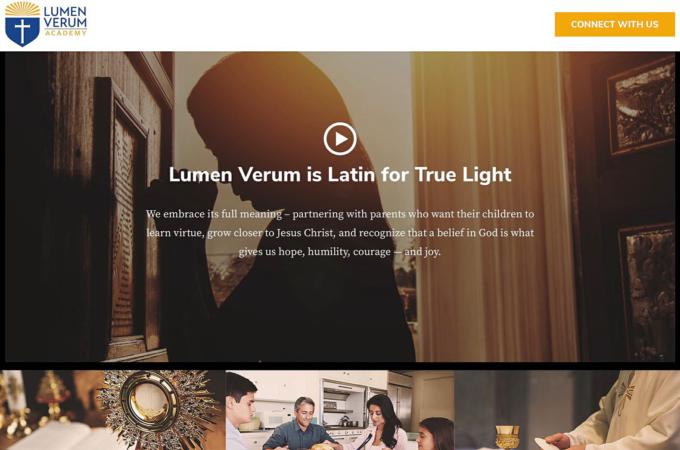Archdiocese launches new academy with hybrid learning model
BRAINTREE -- Having learned from the experience of remote instruction and hybrid models during the coronavirus pandemic, the archdiocese's new Lumen Verum Academy intends to combine the best aspects of learning at home and in person.
Rooted in the classical tradition, Lumen Verum Academy's programming includes virtual classes, distinguished guest speakers, and opportunities for students and families to spend time together and build community in a context of faith.
Though not a direct response to the coronavirus pandemic, this new model builds on what the Catholic schools of the archdiocese learned during the past year. In the spring of 2020, the schools had to quickly master and implement new technologies to enable remote learning. That summer and fall, they experienced an increase in enrollment after public schools continued remote learning and delayed the start of the academic year. Over 4,000 new students enrolled in the archdiocese's Catholic schools, which were committed to opening as soon as they were allowed.
"We come out of this past year with a great deal of optimism about the future of Catholic education, but we also think that we have to be innovative at the same time," archdiocesan superintendent Thomas Carroll said in a June 4 interview.
He said the pandemic taught them two things: it forced them to learn "a tremendous amount" about technology, and it reminded them of the importance of social interaction. He said they know that school is not only about academics, but also about forming friendships.
"From a faith formation perspective, passing on the faith is all about personal encounter. That requires people to be in person together," Carroll said.
He said they wanted to create a school that combines those elements.
The Lumen Verum Academy, which in Latin means "true light," will start by offering grades six through eight, with the goal of adding a grade each year until it fills grades six through 12.
Students will participate in daily prayer and attend weekly Mass or adoration. They will have up to three hours of virtual instruction four days a week, with time for homework included in the daily schedule. Religion will be incorporated into each academic subject.
On Wednesdays and Saturdays, they will have in-person activities for students and their families, such as field trips and liturgies.
"Lumen Verum Academy is not just for your children. It's a place where entire families are encouraged and strengthened to thrive as domestic churches," Craig Dyke, co-principal for faith formation and student life, said in a video on the school's website.
The academy's "campuses" are parishes that will serve as home bases for the Wednesday and Saturday field trips and in-person activities. Currently, these parishes include St. Rose of Lima in Topsfield, Our Lady of Fatima in Sudbury, St. Thomas the Apostle in Millis, St. Joseph in Quincy, and St. Mary of the Nativity in Scituate.
Part of the school's appeal is that it has no geographic limitations. Because most of its instruction is virtual, it can reach families that do not live nearby Catholic schools, in areas that Carroll calls "Catholic school deserts."
It also means they can have guest speakers from anywhere in the world. Several are already lined up, including popular speakers like Jason Evert, Chris Stefanick, papal biographer George Weigel, and members of the Sisters of Life.
Unlike many Catholic schools, Lumen Verum will not test students before making admissions decisions.
"We know that not all kids learn in the same way. Some children may excel at math, and others in writing or art. At Lumen Verum, we celebrate all of these paths to learning. Here there is no entrance exam, because we accept each child as God made them," co-principal for academics Karen Celano explained on the academy's website.
With "a customized academic program uniquely tailored to each student," Lumen Verum can accommodate children of different ages and abilities.
"At Lumen Verum our students take classes that are right for them, to challenge them in areas of strength and support them in areas of growth," Celano said.
As Carroll noted, in a typical American school, students are grouped by age for every subject, even if a student may be advanced in some subjects and struggle with others.
"With virtual instruction, we can allow kids to flow up and down among the classes rather easily. So that's been very attractive to parents," Carroll said.
He said they are raising money for scholarships for those who cannot afford full tuition, "to make sure we can make it as affordable as possible for the greatest array of people from all different walks of life."
"I think that openness to everybody as God made them is the social mission of the school. I think that's a core message that we're trying to get out," he said.
Carroll said he thinks students at Lumen Verum Academy will get "the best of both worlds."
"They're getting the advantages of technology, and they're also getting the advantages of concentrated social interaction in a faith-filled setting. So I think it's a nice blend," he said.
More information about Lumen Verum Academy is available at LumenVerumAcademy.org.



















